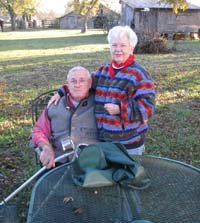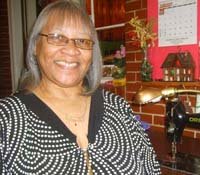Grady Torrance
Interview by Art Thomas

The interview took place at the farm, the old home house of Grady and his lovely wife Francis Torrance. Yes, they have managed to keep it together all these years.
Grady, as I would like to refer to him, thirty-two plus years, after my graduation. During his career, Grady was deemed “one of those teachers”, who inspired many boys to want to be in his class. Among other things, it appeared that the girls liked you better after taking Major Grady Torrance’s class. It seemed that way to me any how.
The interview began with Grady commenting on the Milledgeville, Georgia school drop out rate being approximately 40% and suspecting among Blacks, it would be even higher. The system is broken!
He continued with comments about me, Art Ross Thomas, whom I knew as a student at GMC, he took my Geography class. What I remember most is that there were few blacks attending GMC, during the early stages of integration, “69” through “76, Art was one of the few who stuck it out from eighth grade through Jr. College. I remember Arthur as a tall skinny black kid. During that time period, he could not help but stand out. It seems he was on the shy side, not loud and pushy. He was a reasonable student, who worked hard to pass.
After learning Arthur had secured a position on the football team, I was concerned that “it” might be harder for him to continue his studies as well as being a team player. How would he fair? I remember at that time, we had one or two bigot coaches. Art gave me an example of how unfair it was: “The GMC athletics banquet was traditionally held at the Milledgeville country club, which during that time, took painstaking pride in refusing to serve blacks. Well, Arthur, as an athlete was entitled to participate in the traditional festivities, but the country club refused to make an allowance for him. However, GMC changed locations and festivities were held.” Arthur stuck with it and a mutual respect was gained, in particular, with my two sons, who were also Arthur’s age. I was pleased to learn Arthur eventually earned two degrees and an ROTC commission.
Grady opened the next part of the interview with questions for me, he wanted to know what was I doing at this time or wanted to do with the next chapter of my life. I explained, many things I wanted to accomplish to help make life fairer for all.
Grady, responded by saying, Life is not fair, Life is unfair. He continued by saying “The best thing to do is to take whatever you got and do the best thing you can with what you have”. My greatest achievement is helping my children grow up and achieve their goals. I believe my own physical handicap played an important role as a parent, because it caused me to spend more time with my family. As a parent and teacher, professor, 4-H member, I took my classes further than the school book. I talked about values and those things they were interested in to make their lives better. The Interview concluded with me thanking Grady for his willingness to share.
During the early stages of integration in the south, there were many incidents with violent retaliations. My experience and transition was different. The kids had two options, to accept me and those who looked like me or violently try to run me/us away, as happened in many other schools. I thank God, for the most part; the students and teachers chose to accept me.
Why Grady Torrance? In America, being black, at one time, was a serious overt handicap. Much of what I learned to get through GMC was learned from watching Major Grady Torrance, who had and still does have what I would consider, a serious handicap.
Since that time I spent at GMC, it has been my goal to live my life in such a way that it makes the transition just as smooth or even better for every kid and teacher. My challenge is if you do not put anything good into it, how can you expect something good to come out?
Grady was also Angie's economics professor.















